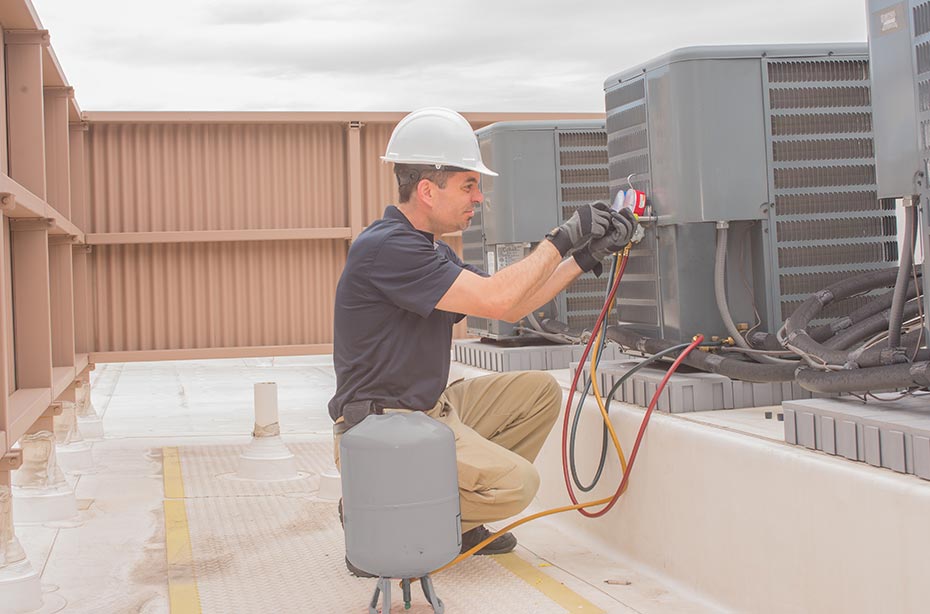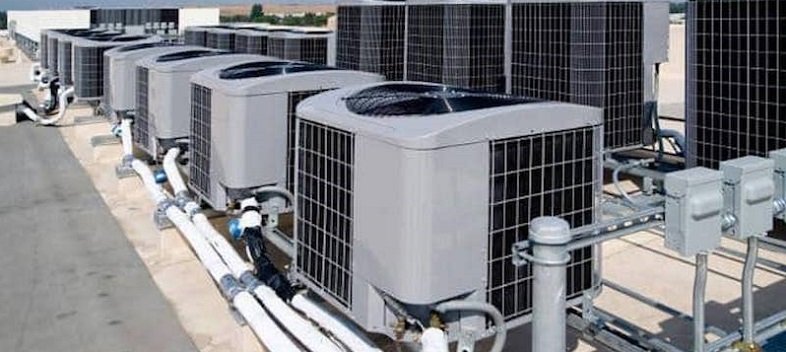Picking Between a Warm Pump and Furnace: Key Factors To Consider for Your HVAC Demands
When reviewing home heating choices for cooling and heating needs, the choice between a heat pump and a heater can be complex. Each system offers distinctive advantages tailored to details climates and power effectiveness goals. Recognizing these distinctions is important for making an informed choice. Key variables such as installment costs and environmental impact even more make complex the option process. Which option truly straightens with one's comfort and sustainability preferences? The complying with sections will certainly check out these factors to consider thoroughly.
Comprehending Heat Pumps: Just How They Work and Their Benefits
While several house owners consider different home heating choices, recognizing how heatpump function and their advantages can greatly influence their choice. Heatpump run by moving heat instead than creating it. In the winter months, they extract heat from the outdoors air or ground and transfer it inside, while in the summer, they reverse this process, cooling down the home by expelling warm outside. This twin functionality makes them flexible for year-round climate control.One of the key advantages of heat pumps is their energy effectiveness. They make use of significantly much less electricity compared to conventional heater, possibly causing lower utility bills (heat pump replacement ooltewah tn). Additionally, heatpump have a smaller sized carbon footprint, making them an eco-friendly choice. They likewise call for much less maintenance than standard systems, adding to long-lasting price savings. On the whole, comprehending the technicians and advantages of warmth pumps can assist property owners make informed choices regarding their home heating and cooling demands
Discovering Heaters: Kinds, Procedure, and Advantages
Heating systems are available in various types, consisting of gas, electrical, and oil designs, each with unique operational devices. Recognizing these distinctions is necessary, as they influence effectiveness and heating performance. In addition, heating systems use various benefits, such as regular warm output and integrity in cooler climates.
Types of Heaters
Heating unit can vary considerably in layout and operation, with furnaces being a preferred option among home owners. There are a number of kinds of heaters, each using different gas sources and innovations. Gas furnaces prevail, leveraging gas to generate warm effectively. Electric heaters, on the various other hand, use electrical resistance to produce heat, usually favored for their uncomplicated installment. Oil heaters, while less usual, work in areas with restricted gas access (heat pump installation ooltewah tn). Furthermore, condensing heaters optimize energy effectiveness by recycling and capturing exhaust gases. Each kind runs through a system of warm exchangers and ductwork to disperse warm air throughout a home. Comprehending the differences between these heating system kinds is important for educated HVAC decisions
Advantages of Heaters
For homeowners seeking reliable warmth during chilly months, the benefits of heaters are significant. Furnaces offer constant home heating, making certain even temperatures throughout the home. They are particularly effective in severe cold, often outmatching heatpump in cold problems. Different kinds, consisting of gas, electrical, and oil furnaces, provide adaptability to satisfy diverse demands and preferences.Furnaces also have a tendency to have lower first setup prices contrasted to heatpump, making them an extra available alternative for many. Their robust style contributes to a much longer lifespan, with several units lasting over 15 years with correct maintenance. Furthermore, modern heaters are usually furnished with sophisticated technology for enhanced effectiveness, which can bring about reduced energy bills. Overall, heaters remain a reliable selection for efficient home heating.

Power Efficiency: Contrasting Heat Pumps and Furnaces
When contrasting energy effectiveness in between warm pumps and furnaces, the Seasonal Power Performance Ratio (SEER) plays an important function in identifying performance. In addition, a functional cost evaluation reveals the long-lasting monetary ramifications of each system. Comprehending these elements can guide property owners in making notified decisions concerning their heating remedies.
Seasonal Power Effectiveness Proportion
Power performance plays a necessary function in the decision-making procedure in between warm pumps and heating systems, especially when considering the Seasonal Power Performance Proportion (SEER) This statistics procedures the cooling effectiveness of warmth pumps over an entire cooling period, providing a standard way to review efficiency. Higher SEER ratings show greater energy efficiency, translating to reduced power consumption and decreased energy bills. In comparison, heating systems are generally examined making use of the Annual Gas Utilization Effectiveness (AFUE) rating, which shows heating performance. When contrasting these two systems, house owners must focus on SEER ratings for heatpump, as they directly influence overall power cost savings and environmental sustainability. An extensive understanding of SEER can especially influence the long-lasting complete satisfaction and cost-effectiveness of the chosen a/c remedy.
Operational Price Analysis
Recognizing the functional prices related to heatpump and furnaces is crucial for property owners evaluating their options. Warm pumps typically provide higher energy performance, converting electric energy into warm with minimal waste. This leads to lower month-to-month utility bills, especially in moderate environments. Alternatively, traditional heaters, particularly gas versions, may have lower upfront expenses however can sustain greater functional expenditures gradually because of sustain costs and efficiency ratings.Moreover, heat pumps can work as both heating and cooling down systems, potentially reducing the requirement for different a/c units. While initial financial investments for heatpump might be greater, their long-lasting savings in energy effectiveness can make them a much more cost-effective option for several households. Cautious evaluation of neighborhood energy prices is important to determine the very a fantastic read best option.
Installation Expenses: What to Anticipate for each and every Heating System
Installation prices for furnace can differ substantially in between heatpump and furnaces, influencing house owners' choices. Warmth pumps usually have greater ahead of time installment costs, normally varying from $3,500 to $8,000, relying on the device dimension and intricacy of setup. This includes the outside unit, indoor handling system, and necessary ductwork modifications. Conversely, furnaces investigate this site often tend to have reduced preliminary expenses, averaging between $2,500 and $6,000, which can be appealing for budget-conscious homeowners. However, installation expenditures can boost if considerable ductwork is required.Moreover, the selection of fuel type for heaters-- gas, gas, or electric-- can also impact installment costs. While heat pumps use energy performance, their preliminary investment might deter some purchasers. Eventually, reviewing installation expenses together with long-term financial savings and effectiveness will assist home owners in making educated choices about their furnace.
Environment Considerations: Which System Performs Better in Your Area
How do climate problems influence the effectiveness of heater? The performance of heat pumps and furnaces can differ significantly relying on the neighborhood climate. In moderate environments, heatpump excel by successfully transferring warm from the outside air, making them an energy-saving choice. Their efficiency diminishes in incredibly cool temperature levels, where they may struggle to extract adequate warm. Alternatively, heating systems, particularly gas designs, give trusted and consistent heat no matter exterior conditions, making them more effective in colder regions.In locations that experience milder wintertimes, warmth pumps can their website operate successfully year-round, offering both home heating and cooling. On the other hand, areas with rough winters months frequently profit from the effectiveness of furnaces. Inevitably, comprehending the neighborhood climate is essential when deciding in between a warmth pump and a heating system, as it straight influences their operational efficiency and total efficiency.
Upkeep Demands: Long-Term Look After Warmth Pumps vs. Furnaces
While both warm pumps and heaters need normal maintenance to assure peak performance, their specific needs and treatment routines vary considerably. Heaters commonly require much less constant focus, with annual examinations sufficing to examine for gas leakages, tidy filters, and analyze overall functionality. Their less complex layout usually enables uncomplicated repairs.In comparison, heatpump necessitate biannual maintenance as a result of their dual role in home heating and cooling. This consists of cleansing coils, examining cooling agent degrees, and ensuring that both the outdoor and indoor devices operate at their best. In addition, heatpump maintenance often involves more detailed parts, making expert servicing essential.Neglecting maintenance can cause diminished efficiency and increased energy expenses for both systems. Eventually, house owners must take into consideration these lasting care demands when choosing in between a warm pump and a heating system, as proactive maintenance can extend the life expectancy and efficiency of either system considerably.
Environmental Impact: Picking a Sustainable Heating Alternative
The environmental effect of heater is a vital analysis for house owners looking for sustainable options. Heatpump are typically more energy-efficient than conventional furnaces, as they transfer warm instead than produce it, greatly lowering carbon emissions. By using eco-friendly energy resources, such as air-source or geothermal heatpump, home owners can additionally decrease their environmental footprint.On the other hand, gas heating systems give off greenhouse gases and add to air contamination, though they usually supply higher heat outcome. Advancements in innovation have actually led to the growth of high-efficiency heating systems that lessen emissions.Ultimately, picking a heating system entails weighing performance versus ecological impact. Home owners are encouraged to reflect on local energy resources and rewards for eco-friendly systems, guaranteeing a choice that aligns with both personal convenience and ecological responsibility. The choice affects not only immediate convenience but also lasting sustainability and environmental health and wellness.
Often Asked Inquiries
Just How Lengthy Do Heat Pumps and Furnaces Normally Last?
The life expectancy of heat pumps generally ranges from 15 to twenty years, while heating systems can last between 15 to three decades. Routine upkeep considerably impacts their durability and performance in supplying heating remedies.
Can I Make Use Of a Heatpump in Incredibly Cold Climates?
Heatpump can operate in incredibly cool environments, however their efficiency reduces as temperature levels drop. In such conditions, extra heating sources may be needed to keep comfy interior temperatures and assure peak efficiency.

What Is the Sound Degree of Warm Pumps Versus Furnaces?
The noise degrees of heatpump and heating systems vary considerably. Usually, heatpump run more silently than standard furnaces, making them more effective for those conscious sound, while heating systems may produce louder functional noises during heating cycles.
Are Heat Pumps Suitable for Both Home Heating and Air conditioning?
Heat pumps are without a doubt ideal for both cooling and heating (furnace replacement). They operate by transferring heat, giving efficient temperature level control year-round, making them a flexible choice for house owners seeking an all-in-one a/c option
What Size Heater Do I Required for My Home?
Establishing the suitable dimension heater for a home requires evaluating factors such as square video footage, insulation quality, local environment, and the home's format. Consulting a professional can ensure an accurate assessment and excellent convenience. Warm pumps generally supply greater energy effectiveness, transforming electrical power right into warm with very little waste. In moderate climates, warmth pumps stand out by efficiently transferring warm from the outdoors air, making them an energy-saving alternative. On the other hand, furnaces, especially gas versions, provide consistent and reliable warmth no matter of outside conditions, making them better in chillier regions.In locations that experience milder winters months, warmth pumps can operate properly year-round, giving both heating and cooling. Heat pumps are normally more energy-efficient than typical heating systems, as they transfer warmth instead than create it, considerably lowering carbon emissions. By utilizing sustainable energy sources, such as air-source or geothermal warm pumps, home owners can further minimize their ecological footprint.On the other hand, natural gas furnaces emit greenhouse gases and add to air pollution, though they frequently give greater warm output.